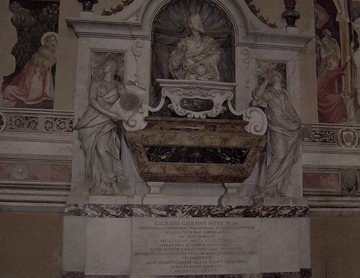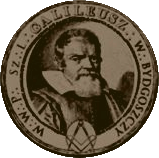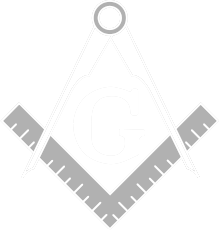
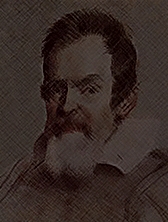 Galileo Galilei (15.02.1564 - 08.01.1642) – italian astronomer and astrologer, physicist and philosopher, founder of moder physics.
Galileo Galilei (15.02.1564 - 08.01.1642) – italian astronomer and astrologer, physicist and philosopher, founder of moder physics.
Born in Piza, he studied medicine on local university. He was also skilled in music (played a lute), and his devotion do Arts was not only aesthetic, but also scientific, as he admired the perfection of harmonic oscillations. He noticed the regularity of pendulum, which drove him to mathemathics. Based on early works of Philon of Bysantium, Galileo Galilei designed first moder thermoscope. That invention led Fahrenheit to the idea of a thermomether.
In 1589 he became a lecturer of mathemethics, geometry and astronomy at Piza University. In accordance with a a Spirit of Reneissance, he was a supporter of scientific method, and belived in empirical verification of theories.
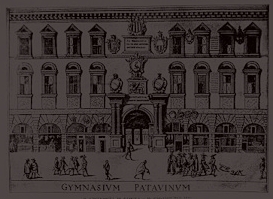 In 1592 he moved to Padwa, to lecture mathemathics. He was also interested in astronomy (he made interesting lunar observations with own-designed telescope). starting from 1619, he was confronted by jesuite professors, esp. father Orazio Grassi. Initially, the core of dispute was a comet creation theory, but the conflict transofrmed into more philosophical nature. This lead to the dangerous clash with officials from Catholic Church, including famous Inquisition Office. It should be noted here, that these days it was really unwise (or fatal to publically support theories that opposed papal science).
In 1592 he moved to Padwa, to lecture mathemathics. He was also interested in astronomy (he made interesting lunar observations with own-designed telescope). starting from 1619, he was confronted by jesuite professors, esp. father Orazio Grassi. Initially, the core of dispute was a comet creation theory, but the conflict transofrmed into more philosophical nature. This lead to the dangerous clash with officials from Catholic Church, including famous Inquisition Office. It should be noted here, that these days it was really unwise (or fatal to publically support theories that opposed papal science).
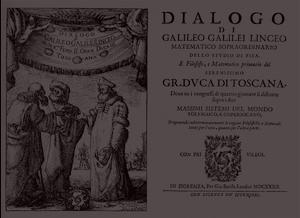 Galilei supported Copernican theory (placing Sun in the middle of Solar System), which opposed the official statement of Catholic Church. The astronomer claimed, however, that the Bible should not be read literally, but rather as a general guidance. In 1616 he tried to defend Copernican ideas in Rome, but he encountered a rugged opposition. Finally, the Inquisition Office decided, that heliocentristic theory is false and heretic. Cardinal Bellarmine required Galilei's resignation of Copernicus support. The astronomer ceased to officialy support Copernicus up to the change of a Pope.
Galilei supported Copernican theory (placing Sun in the middle of Solar System), which opposed the official statement of Catholic Church. The astronomer claimed, however, that the Bible should not be read literally, but rather as a general guidance. In 1616 he tried to defend Copernican ideas in Rome, but he encountered a rugged opposition. Finally, the Inquisition Office decided, that heliocentristic theory is false and heretic. Cardinal Bellarmine required Galilei's resignation of Copernicus support. The astronomer ceased to officialy support Copernicus up to the change of a Pope.
In 1623 Maffeo Barberini (a Galileo's friend) was elected as a new leader of Roman Catholic Church. Hoping to get some protection from him, Galilei published his opus magnum, Dialogo sopra i due massimi sistemi del mondo (1632). There, he desribed both views (heliocentric and geocentric) in a form of a dispute - however, he pointed out all inconsitiences of the latter. To make it worse, he also included pope's statements.
The pope reacted fiercely. In 1633 was put to Inqusition trials. He stated, that he had never supported theses banned in 1616, but only described both opinion (which was allowed). However, the prosecutor forced Galilei to accept, that one COULD falsely interpret the Dialogi as support for Copernic thesis. In result, the final judgement included the following:
- Galileo was found "vehemently suspect of heresy", namely of having held the opinions that the Sun lies motionless at the centre of the universe, that the Earth is not at its centre and moves, and that one may hold and defend an opinion as probable after it has been declared contrary to Holy Scripture. He was required to "abjure, curse and detest" those opinions.
- He was sentenced to formal imprisonment at the pleasure of the Inquisition. On the following day this was commuted to house arrest, which he remained under for the rest of his life.
- His offending Dialogue was banned; and in an action not announced at the trial, publication of any of his works was forbidden, including any he might write in the future.
Galieli accepted the sentence, but according to popular legend, after recanting his theory that the Earth moved around the Sun, Galileo allegedly muttered the rebellious phrase "And yet it moves!"
Galileo continued to receive visitors until 1642, when, after suffering fever and heart palpitations, he died on 8 January 1642, aged 77. The pope's hatred was so intense, that Urban VIII disallowed the memorial burial in mausoleum. Only the small tomb could be used. The astronomer's ashes were re-buried after 100 years.
